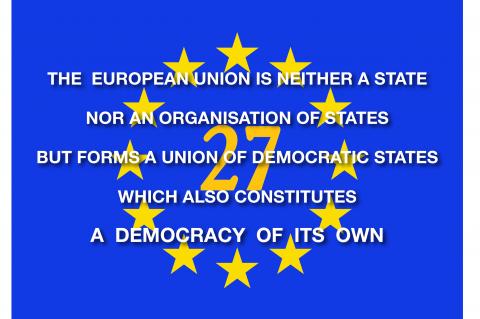The March of the Magistrates, which took place in Warsaw on January 11 2020, heralded a new stage in the process of European integration. Judges from various EU member-states gathered in the Polish capital in order to lend support to their colleagues, demonstrating against the erosion of the rule of law in Poland. In doing so, the judges highlighted that respect for the rule of law is no longer an internal matter for EU member-states. Instead, the March of the Magistrates confirms that the EU has become the guardian of the rule of law.
Guest blog by Jaap Hoeksma
The European Union is the first organisaton of states to evolve to a transnational democracy. The process of European integration started in the aftermath of WWII as an attempt to prevent the renewed outbreak of war. By sharing the exercise of sovereignty over coal and steel the six founding states envisaged to make war not only unimaginable, but also practically impossible. So, the European Coal and Steel Community, established in 1951, was an international organisation with the specific goal of preventing war.
As pooling sovereignty proved to be a reasonable price for enjoying peace, the founding states took their initiative to a next level by broadening the cooperation to the entire economy. The aim of the European Economic Community, founded in 1957, was to create an internal market and was described by the nine participating countries in 1973 as a ‘Union of democratic states’.
European Union
In 1992, the –by then- 12 member-states made a decisive leap forward by establishing the EU and by introducing a citizenship of the Union. Although the purpose of this innovation was unclear at the time, the citizens of the member-states were henceforth also to be regarded as citizens of the Union. In effect, the EU was founded as a ‘Union of citizens and member-states’. Yet, it would take almost two decades before lawyers dared to declare:
Civis Europaeus sum
The true potential of EU-citizenship was revealed by the Charter of Fundamental Rights of the EU, proclaimed in 2000 and given the same legal effect as treaties in 2007, and by the subsequent case-law of the EU Court of Justice. EU-citizens are not merely álso citizens of the Union’, but they enjoy full civic and political rights as such! So, almost three decades after the conclusion of the Maastricht Treaty it turns out that introduction of EU-citizenship has laid the foundation for the functoning of the EU as a constitutional democracy.
The Conference about the Future of Europe
Obviously, this evolution is not greeted with the same enthusiasm by everyone in all circles of the EU. One member-state has decided to withdraw from the Union and follows the procedure of article 50 TEU. The initial argument for Brexit was that the EU ought to be –in the words of former PM Cameron- an undemocratic organisation. Moreover, governments of various member-states are beginning to realise that you cannot enjoy the economic fruits of European integration without respecting the rules of the game. Seen in this perspective, the March of the Magistrates has brought home the message that respect for the rule of law and democracy have become essential for EU-membership.
A New Narrative for the EU
The new narrative for the EU (#NN4EU) will have to be based on these values of respect for human rights and democracy. This view was notably expressed by the President of the European Court of Justice during the inauguration of the members of the Commission Von der Leyen on 13 January 2020. In his address the President underlined that no compromise or concession undermining the values of the EU, including respect for the rule of law, democracy and fundamental rights and freedoms, which form ‘the hallmark of the European Union’ can be tolerated.
While the founding fathers could have hardly imagined this outcome, it seems obvious from a contemporary view that, if two or more democratic states agree to share the exercise of sovereignty in an increasing number of fields in order to attain common goals, their organisation should be democratic too. So, the theory of democratic integration, which has been developed by the present author in previous guestblogs on this website, may serve the members of the forthcoming Conference as a source of inspiration and guidance. After all, they will not only have to produce practical solutions for the present transitory problems, but they will also have to come up with a new narrative for the EU.
Jaap Hoeksma is author of the book European Democracy, available in the Library. He will submit these ideas to fellow-citizens during the forthcoming EUROCRACY #FutureofEurope Tour. Info available at euroknow@gmail.com
